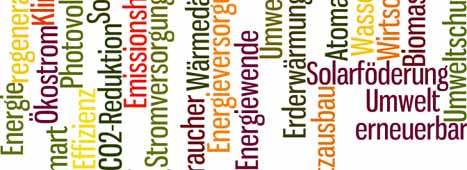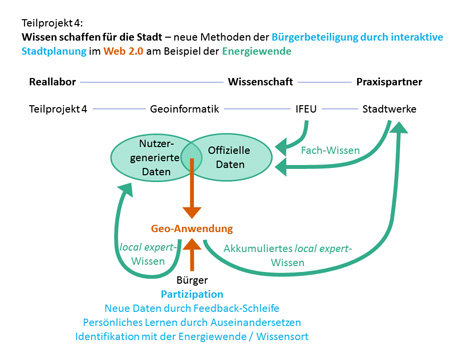Urban Office
| Urban Office | Sub-project 1 | Sub-project 2 | Sub-project 3 | Sub-project 4 |

New Methods of Public Partcipation Through Interactive Urban Planning with Web 2.0 Technologies in the Case of the Energy Turn
Social Media, 3D visualization, WebGIS and Smartphone technologies have lead to new possibilities of sustainable public participation and public knowledge creation and given way for new forms of communication about urban planning projects between different stakeholders from public administration, citizens, industry and science. Many cities have already instated some technological approaches to grant their citizens more direct forms of participation in municipal affairs and issues. E-participation systems and community engagement platforms can play an essential role especially for topics that need a strong support of local communities and who’s success relies on transparency, public awareness and the cooperation of the public. The energy transition currently taking place in Germany is such a topic.
Heidelberg is one of 19 cities that take part in the so called Masterplan 100 % climate protection. The goal is to reduce greenhouse gas emissions by 95 % until 2050. To achieve this ambitious goal it is of great importance to include the citizens in all aspects of the decision-making process.
Sub-project 4 of the “UrbanOffice/RealLab” conducts research on new web based methods for public participation and public knowledge creation processes for urban planning in the context of a sustainable energy transition in Heidelberg.
The central focus of the project rests on the development of interactive geospatial web tools which play an essential role to ease space related communication about local energy transition topics and are of great importance for the process of urban planning. Therefore the project partners from sub-project 4 - the GIScience Research Group together with the Institute for Energy and Environmental Research (ifeu), the “Stadtwerke Heidelberg” a municipal energy supplier, and the IBA - Internationale Bauausstellung (IBA) Wissen | schafft | Stadt
(IBA - International Building Exhibition knowledge based urbanism
) - are working closely together to develop a prototypical platform in which energy relevant topics like Housing/Buildings, Mobility, Food/Consumption and Energy supply are brought together with new approaches and interactive tools from e-participation.
The goals of the masterplan require new intelligent and efficient concepts and solutions for the consumption and supply. The Stadtwerke Heidelberg
is planning a storage tower for long-distance heating energy and thus is an important stakeholder in this long term process of change. This technical building shall be accompanied by offerings to the public to facilitate knowledge exchange and knowledge creation and is planned to be a part of a wider climate network of other related places in the city which shall gain attraction and create sensitivity among citizens on the topic.



